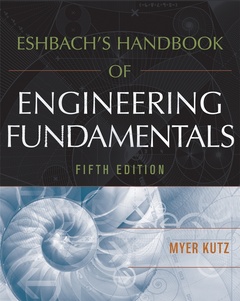Eshbach's handbook of engineering fundamentals (5th Ed.)
Auteur : KUTZ Myer

Contributors.
1. Mathematical and Physical Units, Standards, and Tables (Jack H. Westbrook).
1. Symbols and Abbreviations.
2. Mathematical Table.
3. Statistical Table.
4. Units and Standard.
5. Tables of Conversion Factors.
6. Standard Sizes.
7. Standard Screws.
2. Mathematics (J. N. Reddy).
1. Arithmetic.
2. Algebra.
3. Set Algebra.
4. Statistics and Probability.
5. Geometry.
6. Trigonometry.
7. Plane Analytic Geometry.
8. Solid Analytic Geometry.
9. Differential Calculus.
10. Integral Calculus.
11. Differential Equations.
12. Finite Element Method.
13. Laplace Transformation.
14. Complex Analysis.
15. Vector Analysis.
Bibliography.
3. Mechanics of Rigid Bodies (Wallace Fowler).
1. Definitions.
2. Statics.
3. Kinematics.
4. Kinetics.
5. Friction.
Bibliography.
4. Selection of Metals for Structural Design (Matthew J. Donachie).
1. Introduction.
2. Common Alloy Systems.
3. What Are Alloys and What Affects Their Use?
4. What Are the Properties of Alloys and How Are Alloys Strengthened?
5. Manufacture of Alloy Articles.
6. Alloy Information.
7. Metals at Lower Temperatures.
8. Metals at High Temperatures.
9. Melting and Casting Practices.
10. Forging, Forming, Powder Metallurgy, and Joining of Alloys.
11. Surface Protection of Materials.
12. PostService Refurbishment and Repair.
13. Alloy Selection: A Look at Possibilities.
14. Level of Property Data.
15. Thoughts on Alloy Systems.
16. Selected Alloy Information Sources.
Bibliography.
5. Plastics: Information and Properties of Polymeric Materials (Edward N. Peters).
1. Introduction.
2. Polyolefinic Thermoplastics.
3. Side Chain Substituted Vinyl Thermoplastics.
4. Polyurethane and Cellulosic Resins.
5. Engineering Thermoplastics: Condensation Polymers.
6. High Performance Materials.
7. Fluorinated Thermoplastics.
8. Thermosets.
9. General Purpose Elastomers.
10. Specialty Elastomers.
References.
6. Overview of Ceramic Materials, Design, and Application (R. Nathan Katz).
1. Introduction.
2. Processing of Advanced Ceramics.
3. Brittleness and Brittle Materials Design.
4. Applications.
5. Information Sources.
6. Future Trends.
References.
7. Mechanics of Deformable Bodies (Neal F. Enke and Bela I. Sandor).
1. Introduction to Stress and Strain.
2. Beams and Bending.
3. Torsion and Shafts.
4. Plates, Shells, and Contact Stresses.
5. Nonlinear Response of Materials.
6. Energy Methods.
7. Composite Materials.
8. Theories of Strength and Failure
References.
8. Nondestructive Inspection (Robert L. Crane and Jeremy S. Knopp)
1. Introduction
2. Liquid Penetrants.
3. Radiography.
4. Ultrasonic Methods.
5. Magnetic Particle Method.
6. Thermal Methods.
7. Eddy Current Methods.
Appendix: Ultrasonic Properties of Common...
Date de parution : 02-2009
Ouvrage de 1320 p.
